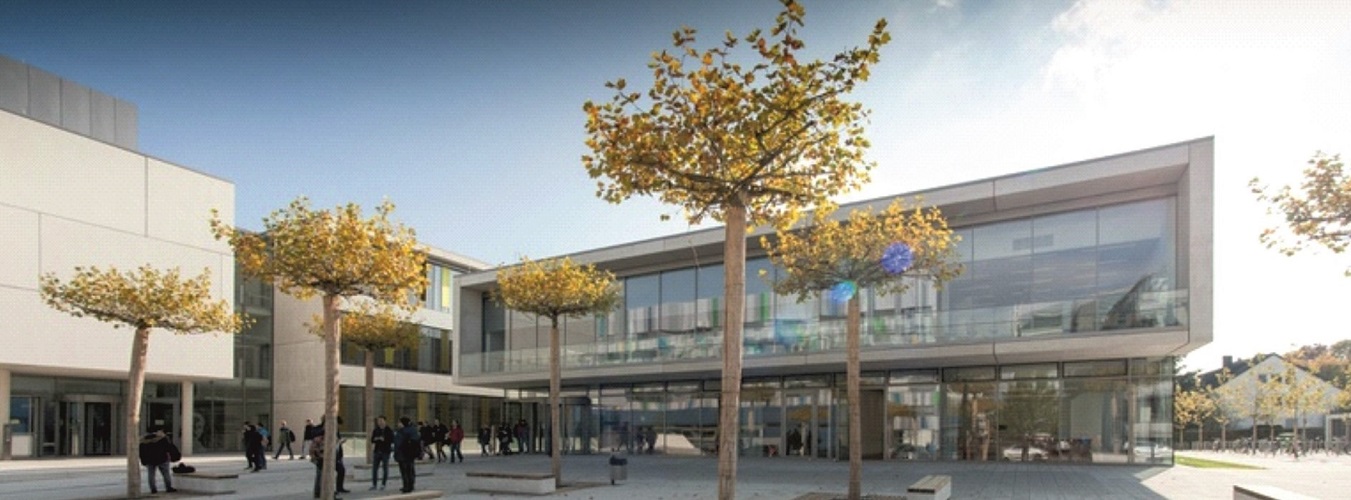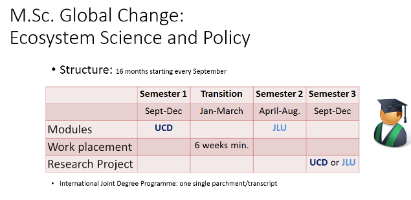The MSc in Global Change: Ecosystem Science and Policy degree is aimed at individuals who intend to pursue a career in the wide field of ‘Environmental issues’ with the skills to understand the science as well as communicating policy-relevant evidence to diverse audience.

Global Change...be the change you wish to see in the world!
You must be the change you wish to see in the world.
Live as if you were to die tomorrow; learn as if you were to live forever.
Mahatma Gandhi
Frequently Asked Questions
Graduates may pursue roles as policy adviser, scientific analyst or researcher, be it in government, international organisations, NGOs, research institutes or consulting companies. There are also many opportunities for further studies. The skills you acquire, particularly through the completion of the Minor Thesis provides a strong foundation for PhD research.
Prospective Employers could be for example: Senior Policy Adviser ; Research analyst; Environmental scientist; Environmental and Sustainability consultant; Sustainability strategy analyst; Climate officer at city and regional level; Senior project manager; Regulatory project manager;
The majority of the students who took this course so far have a life sciences as well as other science, engineering, agriculture and geography degrees. This course is first of all a science course and therefore a minimum knowledge of science is required. However, other degrees can be considered by the Admission committee.
The 16 month long 120 ECTS or credit points course entails taught modules with field components and practicals, seminars, group work and critical discussions as well as a mandatory work placement and an independent research project. The first semester is based at UCD, followed by the 6 weeks minimum contact-time work placement. The second taught semester is based at JLU and the third semester is comprised of the individual research project which can be undertaken in either UCD or JLU.

In UCD, modules are delivered either in one or two hour lecture sessions every week for 12 weeks or several times during a week for a block period of 4 weeks. All lectures take place between 9:00 and 6:00 pm, Monday to Friday. The timetable is available to the students as soon as they have registered.
In JLU, modules are delivered also either in a week-long block or during the semester. Lectures take place between 8.00 and 5:00.
Click below the link to download a presentation on the core (compulsory) and optional modules available at each institution.
You can apply any time through UCD Graduate Admissions. You are advised to apply as early as possible (starts in November for the following September). UCD operates a rolling admissions policy which means that all applications are reviewed on a rolling case-by-case basis, with every effort made to inform applicants whether they have been accepted, rejected, or placed on a waiting list within two weeks of the receipt of a complete application.
There is no particular deadline for submission of applications. We will accept applications on a rolling case-by-case basis. However, if you wish to benefit from our special scholarship awards, some deadlines will apply. For example, the deadline for North American applicants for the Global Excellence award is 1st January (for Sept start of that year). For more information checkhere.
To apply online please go towww.ucd.ie/applyand create a user account; select “Graduate Taught Courses” as your application type from the drop down list and then select “MSc Global Change: Ecosystem Science and Policy (F038)”.
We also require the following documents to be submitted:
- Official transcripts of prior university resultswith a breakdown of all module grades*
- A copy of birth certificate or passport
- Proof of English language competence. (For non-native English speakers only. On English competence, see details below.)
* Applicants who completed a bachelor's degree at UCD do not have to submit a transcript.
These documents should be uploaded online. Should you encounter technical difficulties, they can be submitted by post to Online Applications, Admissions Office, Tierney Building, University College Dublin, Belfield, Dublin 4, Ireland.
Entrance to the programme requires a recognised Bachelor honours degree (that is with 180 ECTS credit points) or equivalent, with a GPA of 2.48 or higher, in an appropriate life sciences discipline, such as biology, agriculture or environmental science (including zoology, ecology, geology, biochemistry) as well engineering and physics. Geography and political science degrees are also considered but will be reviewed by the Global Change Committee separately.
If English is not your native language, proof of your proficiency in English will be required, unless you took your primary degree through English in an English speaking country. The minimum acceptable score on the TOEFL Internet Based Test is 100, on the IELTS system it is 6.5. Applicants who obtained a previous degree from an English-speaking university may be exempted from this requirement.
More information for UCD International students can be found here. Information about (opens in a new window)JLU
The application fees is necessary for your application to be reviewed. This is the case for all programmes in UCD.
Yes. We do not allow for part-time students and we really mean full-time!
This Masters programme is distinctive in that it offers students the opportunity to spend 6 to 8 weeks on a work placement. You will be placed in a setting that reflects your own interests. You can also ask the programme co-ordinator to review a particular internship (e.g. a company of your choice that you might be interested in working for). The work placement can be carried in any country of your choice. Placements may vary considerably but students will normally be placed in industry, government, non-government or research agencies where they will obtain a breadth of practical experience to complement their degree programme. Through this work placement, you will acquire transferable skills which will make you a sought after and effective employee.
A Programme Internship Manager is dedicated to helping the students securing a work placement and helping them with their applications, CVs, cover letters as well as giving them mock interviews and advise on work ethics.
See more info here
The independent research project is carried out either in UCD, JLU or another university. In certain cases, the student may be working from another institution but he/she will be assigned a supervisor from either university as well as an external supervisor in the host institution.
See more information here
Non-EU students are advised to contact the UCD International Office atwww.ucd.ie/internationalto avail of a range of scholarships.
There is a range of scholarships depending on your country and your achievements so far (e.g. honours in your Bachelor Degree).
For German students, you can benefit from several sources of funding and you contact the JLU International Office at http://www.uni-giessen.de/international-pages.
For European students in general, ERASMUS mobility grants are available for your work placement, semester outside your country (Germany if you are Irish for example) as well as for your research project if you wish to carry it outside your country of residence.
Join us on (opens in a new window)Twitter,or (opens in a new window)Linkedin groupfor discussion with past and current Global Changers!
Go to ourTestimonialsto hear from Global Changer graduates!
If you have more question please email: (opens in a new window)globalchange@ucd.ie
